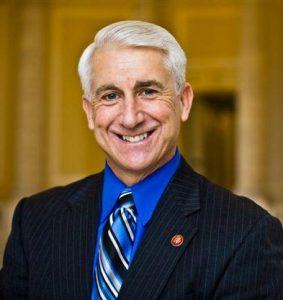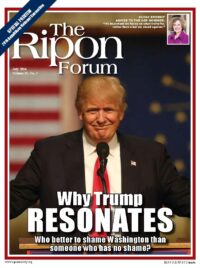 The benefits of free trade to our economy are proven and easily seen: small business expansion, job growth, wage increases, lower consumer prices, and an overall strengthening of the economy. But the overwhelming benefits of trade can also be tracked through the journey of tiny hay seeds planted in the fertile soil of Ellensburg, Washington.
The benefits of free trade to our economy are proven and easily seen: small business expansion, job growth, wage increases, lower consumer prices, and an overall strengthening of the economy. But the overwhelming benefits of trade can also be tracked through the journey of tiny hay seeds planted in the fertile soil of Ellensburg, Washington.
Calaway Trading is a hay and agricultural exporter headquartered in my home state of Washington. Founded in 1987, it has successfully expanded because of trade with Korea, Japan, China, Taiwan, the United Arab Emirates, and 11 other countries across the globe. Now one of the ten largest exporters of hay from the western United States, it has grown its employee base to over 100 workers. With export sales continuing to grow by 5 percent annually, the possibilities for this family-owned farm are endless.
Calaway Trading’s story of expansion through increased international trade is a narrative that is shared across industries for many American companies – both large and small. America’s agriculture, manufacturing, and services sectors have seen their production increase, sales grow, and revenues rise as they tap into the vast consumer base that lies across oceans and outside of America’s borders. With 95 percent of the world’s consumers living abroad, opportunity and trade have become linked.
This is especially true for small to medium sized companies, which make up 98 percent of America’s exporters. Like Calaway Trading, they have discovered that consumers outside our borders are willing to pay for high-quality American-made goods and services. But the extent consumers abroad are willing to pay for even the finest American products has its limits – and that is why strong trade agreements are critical for our job creators to remain competitive globally.
The connection between strong trade agreements and economic growth in the United States is simple, basic math. When we negotiate a trade agreement between the United States and a partner country, we break down tariffs and other barriers that country had in place to limit American businesses from reaching consumers inside their borders. That was the case when we negotiated a trade agreement with South Korea. Prior to that agreement, U.S. cherry growers faced a 24 percent tariff when they sold their cherries in Korea, but our agreement with Korea eliminated this tariff.
The connection between strong trade agreements and economic growth in the United States is simple, basic math.
In the year after the agreement took effect, our cherry exports to Korea nearly doubled and have continued to grow, making Korea our third largest market for cherries. This is not our only success. Take for example the reduction of tariffs and other barriers that were limiting U.S. exports of pork to Colombia. Because of our trade agreement with Colombia, American pork producers can better compete with their foreign competitors and their exports have tripled in value, increasing the number of Americans they employ right along with it. These are just two examples of how trade agreements result in more jobs and more revenue here at home.
These facts have been confirmed by the independent International Trade Commission (ITC) in a recent report. According to the ITC, trade agreements have positively impacted our trade deficit, increased U.S. gross domestic product (GDP), and increased U.S. employment and wages. And for middle and lower income Americans looking to provide for their families, trade agreements have offered greater consumer choice and lower prices. Further, workers seeking a pay raise also benefit as U.S. trade jobs pay 13 to 18 percent more than non-trade related jobs.
It is not just American workers and families who recognize trade is the key to succeeding in the 21st Century economy. Our competitors across the globe are tapping into foreign markets too and are – and will continue – negotiating trade agreements with or without us. If we fail to implement trade agreements while our competitors race ahead to aggressively knock down trade barriers for their own benefit and increase their own market share, we will lose our competitive edge as our costs go up and opportunities drop. Sitting on the sidelines also means countries like China, not us, will be writing the rules and setting the standards the rest of the world will be forced to play by. Trade agreements give us tools to enforce our rights and make sure our trading partners are living up to their obligations.
The best way to help our companies grow is by removing burdensome tariffs and opening up new markets.
Critics of trade often blame trade agreements for any negative development in manufacturing. I certainly acknowledge that sometimes trade can displace workers in particular sensitive sectors. I also agree that we should help these workers. In fact, I introduced bipartisan legislation last year, which became law, to provide cash benefits and training for workers affected by trade to give them the tools to remain in the work force. However, the majority of U.S. industries and their workers strongly benefit from trade agreements. Blaming trade agreements for any and all negative events ignores the dramatic influence technology and current economic environments have had on different sectors around the world. What once was done by many hands is now often done by machines and smart devices. Are opponents of trade willing to give up their cell phones to reignite the switchboard industry? Just as carriage makers surely took a hit with the invention of Henry Ford’s Model T, technologies evolve and industries, workers, and economies must adjust.
The best way to help our companies grow is by removing burdensome tariffs and opening up new markets, allowing us to generate new jobs, design and create more products here in the U.S., compete on a global scale, establish our standards abroad, and bring home more profits. American workers, businesses, and producers create and make the best products and services in the world – don’t we want to give them the opportunity to sell in markets around the globe? When we knock down barriers for our exporters, they always compete and win.
Free enterprise and competition pave the way to prosperity. These principles do not change when you cross national, regional, or party lines. If America is to remain the world’s economic leader, we must embrace trade and all it has to offer.
Dave Reichert represents the 8th District of Washington in the U.S. House of Representatives. He serves as Chairman of the Ways & Means Subcommittee on Trade.




